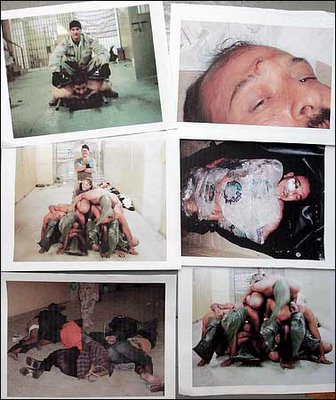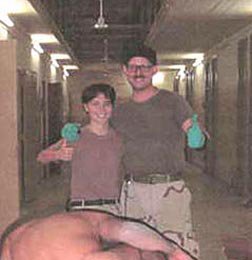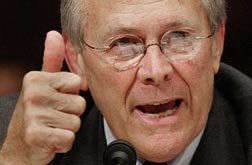Bush : 'We Do Not Torture'

Well, we're all glad he could clear that up. I suppose this means any objections to McCain's anti-torture bill have been dropped. But why is Crashcart out campaigning for a special exemption that will allow the CIA to torture people - all the while insisting that the US doesn't do that sort of thing? He doesn't say that we won't. Are we just tired of outsourcing the job?
"This isn't about who they are. This is about who we are. These are the values that distinguish us from our enemies." -- Sen. John McCain



We'd like to think so.

4 Comments:
Truth About Torture
A courageous soldier and a determined senator demand clear standards.
By Michael Hirsh
Newsweek
Nov. 7, 2005 issue - Army Capt. Ian Fishback is plainly a very brave man. Crazy brave, even. Not only has the 26-year-old West Pointer done a tour in Iraq and one in Afghanistan, he has had the guts to suggest publicly that his boss, Donald Rumsfeld, lied to Congress. After making headlines a month ago for alleging that systematic interrogation abuses occurred in Iraq—and that the Pentagon was not forthright about it—the plain-spoken Fishback went back to Fort Bragg, N.C. He is now practicing small-unit tactics in the woods for a month as part of Special Forces training. After that, he hopes to fight for his country once again overseas.
Fishback's courage in taking a lonely stand may be paying off. Inspired by his example, "a growing critical mass of soldiers is coming forward with allegations of abuse," says Marc Garlasco of Human Rights Watch, the New York-based activist group that first revealed Fishback's story. One of them is Anthony Lagouranis, a Chicago-based Army specialist who recently left the military. He supports Fishback's contention that abuses in Iraq were systematic—and were authorized by officers in an effort to pressure detainees into talking. "I think our policies required abuse," says Lagouranis. "There were freaking horrible things people were doing. I saw [detainees] who had feet smashed with hammers. One detainee told me he had been forced by Marines to sit on an exhaust pipe, and he had a softball-sized blister to prove it. The stuff I did was mainly torture lite: sleep deprivation, isolation, stress positions, hypothermia. We used dogs."
Fishback has also won a devoted and powerful ally in Sen. John McCain, who says that the captain's tale "is what I view as the tip of the iceberg in the military today." Fishback's account has proved to be a prime exhibit in McCain's long-running feud with Rumsfeld over conduct of the Iraq war. In a long letter to Congress obtained by NEWSWEEK, Fishback told McCain and others in Congress that when the Defense secretary testified before Congress in the aftermath of the 2004 Abu Ghraib abuse scandal, Rumsfeld did not accurately represent what was occurring in Iraq.
Fishback said that many of the brutal practices shown in the Abu Ghraib photos—which the Pentagon called the work of a few rogue soldiers "on the night shift"—were actually "in accordance with what I perceived as U.S. policy." After he heard Rumsfeld testify in May 2004 that the U.S. forces were following the Geneva Conventions in Iraq, Fishback wrote: "I was immediately concerned that the Army was taking part in a lie to the Congress, which would have been a clear violation of the Constitution." Based on what he saw, Geneva rules for prisoner treatment were not being followed, he says. And for 17 months, a frustrated Fishback tried to get a clear answer about what standards were being used— consulting his superior officers, Army lawyers, even a professor of philosophy at West Point, Col. Daniel Zupan. He says he never got an answer. A devout Christian, Fishback held soul-searching discussions with fellow officers in Bible class about what he should do. In the end he went to Human Rights Watch for guidance.
Like Fishback, McCain has grown keenly frustrated by the lack of clarity in the Bush administration's interrogation policies. The Arizona senator, a former POW who was tortured in Vietnam, is now battling the administration over an amendment he has attached to the new defense appropriations bill. It would set down, once and for all, what is allowed in interrogation rooms. In simple, clear language, the two-and-a-half-page amendment forbids cruel, inhuman or degrading treatment "regardless of nationality or physical location"—and defines such treatment as the same as that which is prohibited under the U.S. Constitution. In a rebuke to President George W. Bush last month, the GOP-controlled Senate voted 90-9 to approve the McCain amendment.
The Bush administration has consistently maintained that it is not U.S. policy to abuse prisoners. But Bush has threatened to veto the entire appropriations bill if it contains McCain's language—all in an effort to preserve the right to treat prisoners in whatever way the president decides is necessary. Last week Vice President Dick Cheney, with CIA Director Porter Goss in tow, met with McCain to try to persuade him to exclude the CIA from any restrictions. The administration also sought to cut out the term "regardless of physical location," McCain said in an interview. The Washington Post, in a harsh editorial, later branded Cheney "the vice president for torture." Cheney's spokeswoman, Lea Anne McBride, said she had no comment on the McCain meeting. CIA spokeswoman Jennifer Dyck also declined to talk about it. But John Yoo, a former Justice Department official who drafted an August 2002 memo that justified rough methods, said last week that the administration should continue to treat terrorists differently overseas because they "do not operate according to the Geneva Conventions."
Critics, many of them inside the military, say Yoo and other administration hawks have never understood that U.S. observance of Geneva rules is not dependent on what the enemy does. As McCain puts it: "This isn't about who they are. This is about who we are. These are the values that distinguish us from our enemies." He says the administration could make things worse than they already are by putting a law on the books that will, in effect, authorize abusive practices at overseas facilities. "We aren't going to allow any weakening of language," McCain told NEWSWEEK. If the present bill is vetoed or watered down, he adds, "we will certainly put it on another piece of legislation. I think we could get 90 votes tomorrow." Even at senior levels of the Pentagon, some officials are uneasy about the administration's opposition to the McCain amendment. "The uniformed military is appalled by Cheney's stand," says a Pentagon official who would talk only if he were not identified.
For a year and a half now, the administration has sought to make the Abu Ghraib scandal go away. When questioned about abuses, the Pentagon regularly cites the sheer numbers of punishments it has administered to U.S. personnel—230 cases in all, including jail sentences, demotions and other nonjudicial discipline.
But Defense officials rarely point out that no senior officers or civilian officials have been charged since Abu Ghraib. Other officers say they too are seething over the lack of accountability at senior levels. Colonel Zupan, the West Point philosophy teacher, says he himself should have acted when he was deployed in Afghanistan and heard of similar abuses. "I didn't raise my eyebrows about it," he said. "I think it was wrong of me. And if I didn't, as a field officer, then how are we going to be too harsh on an enlisted soldier?"
The Army has sought to paint Fishback as a lone malcontent. Paul Boyce, an Army spokesman, says the Army Criminal Investigation Division was investigating the captain's allegations. He calls Fishback's long letter "verbiage" and says he had no comment on the questions raised about Rumsfeld's veracity. But NEWSWEEK has obtained corroboration for Fishback's central point in the Army's own files. According to papers released by the Defense Department in September in response to a lawsuit by the American Civil Liberties Union, supporting documents for an inspector-general probe in July 2004 show that abuses were much more widespread than the Army acknowledged. In one IG document, an Army sergeant testifies that putting detainees in stressful positions and pouring water on them "seemed to be something all interrogators" in the Fourth Infantry Division were doing.
Before heading into the Fort Bragg woods this week, Fishback told NEWSWEEK that he doesn't want to talk to the media now. "I will just say: I support clear standards in accordance with American values," he said. Judging from the firestorm he started, he may someday get them.
© 2005 Newsweek, Inc.
© 2005 MSNBC.com
Cheney pushes senators for exemption to CIA torture ban
WASHINGTON (AP) — Vice President Dick Cheney made an unusual personal appeal to Republican senators this week to allow CIA exemptions to a proposed ban on the torture of terror suspects in U.S. custody, according to participants in a closed-door session.
Cheney told his audience the United States doesn't engage in torture, these participants added, even though he said the administration needed an exemption from any legislation banning "cruel, inhuman or degrading" treatment in case the president decided one was necessary to prevent a terrorist attack.
The vice president made his comments at a regular weekly private meeting of Senate Republican senators, according to several lawmakers who attended. Cheney often attends the meetings, a chance for the rank-and-file to discuss legislative strategy, but he rarely speaks.
In this case, the room was cleared of aides before the vice president began his remarks, said by one senator to include a reference to classified material. The officials who disclosed the events spoke on condition of anonymity, citing the confidential nature of the discussion.
"The vice president's office doesn't have any comment on a private meeting with members of the Senate," Steve Schmidt, a spokesman for Cheney, said on Friday.
The vice president drew support from at least one lawmaker, Sen. Jeff Sessions of Alabama, while Arizona Sen. John McCain dissented, officials said.
McCain, who was tortured while held as a prisoner during the Vietnam War, is the chief Senate sponsor of an anti-torture provision that has twice cleared the Senate and triggered veto threats from the White House.
Cheney's decision to speak at the meeting underscored both his role as White House point man on the contentious issue and the importance the administration attaches to it.
The vice president made his appeal at a time Congress is struggling with the torture issue in light of the Abu Ghraib prison scandal and allegations of mistreatment of prisoners at Guantanamo Bay, Cuba. The United States houses about 500 detainees at the naval base there, many of them captured in Afghanistan.
Additionally, human rights organizations contend the United States turns detainees over to other countries that it knows will use torture to try and extract intelligence information.
Cheney's appeal came two days before a former senior State Department official claimed in an interview with National Public Radio's "Morning Edition" that he had traced paperwork back to Cheney's office that he believes led to U.S. troops abusing prisoners in Iraq.
"It was clear to me there that there was a visible audit trail from the vice president's office through the secretary of defense down to the commanders in the field," Lawrence Wilkerson, a former colonel who was Secretary of State Colin Powell's chief of staff during President Bush's first term, said Thursday.
Wilkerson said the view of Cheney's office was put in "carefully couched" terms but that to a soldier in the field it meant sometimes using interrogation techniques that "were not in accordance with the spirit of the Geneva Conventions and the law of war." He said he no longer has access to the paperwork.
Cheney spokeswoman Jennifer Mayfield declined to comment on Wilkerson's remarks.
The Senate recently approved a provision banning the "cruel, inhuman or degrading" treatment of detainees in U.S. custody. The vote was 90-9, and an identical provision was added to a second measure on a voice vote on Friday.
Comparable House legislation does not include a similar provision, and it is not clear whether anti-torture language will be included in either of two large defense measures Congress hopes to send to Bush's desk later this year.
The White House initially tried to kill the anti-torture provision while it was pending in the Senate, then switched course to lobby for an exemption in cases of "clandestine counterterrorism operations conducted abroad, with respect to terrorists who are not citizens of the United States." The president would have to approve the exemption, and Defense Department personnel could not be involved. In addition, any activity would have to be consistent with the Constitution, federal law and U.S. treaty obligations, according to draft changes in the exemption the White House is seeking.
Cheney also has met several times with McCain, including one session that CIA Director Porter Goss attended in a secure room in the Capitol.
PANAMA CITY (Reuters) - U.S. President George W. Bush said on Monday "we do not torture" and defended his administration's efforts to stop the U.S. Congress from imposing rules on the handling of terrorism suspects.
Bush would not confirm the existence of CIA secret prisons that The Washington Post disclosed last week and would not address demands by the International Committee of the Red Cross to have access to the suspects reportedly held at them.
"We are finding terrorists and bringing them to justice," Bush said at a joint news conference with Panamanian President Martin Torrijos. "We are gathering information about where the terrorists might be hiding. We are trying to disrupt their plots and plans. Anything we do ... to that end in this effort, any activity we conduct, is within the law."
Vice President Dick Cheney has been spearheading an effort on Capitol Hill to have the CIA exempt from an amendment by Arizona Republican Sen. John McCain that would ban torture and inhumane treatment of prisoners.
The exemption would cover the secret prisons that The Post said were located in several Eastern European democracies and other countries where key al Qaeda captives are being kept.
"We do not torture and therefore we're working with Congress to make sure that as we go forward, we make it more possible to do our job," Bush said.
He said he was confident that when "people see the facts, that they'll recognize that we've got more work to do and that we've got to protect ourselves in a way that is lawful."
McCain vows torture ban in Senate bills
FROM THE BLADE'S WIRE SERVICES
WASHINGTON - Girding for a potential fight with the Bush Administration, supporters of a ban on torture of prisoners of war by U.S. interrogators threatened yesterday to include the prohibition in nearly every bill the Senate considers until it becomes law.
The no-torture wording, which proponents say is supported by majorities in both houses of Congress, was included last month in the Senate's version of a defense spending bill. The measure's final form is being negotiated with the House, and the White House is pushing for either a rewording or deletion of the torture ban.
At the urging of Sen. John McCain (R., Ariz.), the Senate by a voice vote added the ban to a related defense bill as a backup.
Speaking from the Senate floor, Mr. McCain said, "If necessary - and I sincerely hope it is not - I and the co-sponsors of this amendment will seek to add it to every piece of important legislation voted on in the Senate until the will of a substantial bipartisan majority in both houses of Congress prevails," Mr. McCain said on the Senate floor. "Let no one doubt our determination."
The ban would establish the Army Field Manual as the guiding authority in interrogations and prohibit "cruel, inhumane, and degrading treatment" of prisoners.
The Bush Administration has sought to exempt the CIA from the ban.
Mr. McCain's stature in the fight is enhanced because he was tortured while he was a prisoner during the Vietnam War. When the Senate voted to include the ban in the defense spending bill last month, it was approved overwhelmingly, 90-9.
The House's version of the spending bill does not contain the torture ban. But Rep. John P. Murtha of Pennsylvania, the ranking Democrat on the House defense appropriations subcommittee, earlier this week urged his colleagues to accept the Senate provision.
The provision would reverse the Bush Administration's contention that conditions placed on the treatment of prisoners of war in the International Covenant on Civil and Political Rights and other international treaties signed by the United States do not apply to foreigners held overseas.
President Bush initially threatened to veto the "must-pass" spending bill for the Pentagon if it contained the Senate provision. Later, he sought simply to exempt the CIA from the ban. Mr. McCain called that proposal "totally unacceptable."
Vice President Dick Cheney made a rare personal appeal for Congress to allow the CIA exemption during a weekly meeting with Republican senators earlier this week.
Mr. Cheney told his audience the while the United States doesn't engage in torture, the administration needs an exemption in case the President decided one was necessary to prevent a terrorist attack.
Post a Comment
<< Home